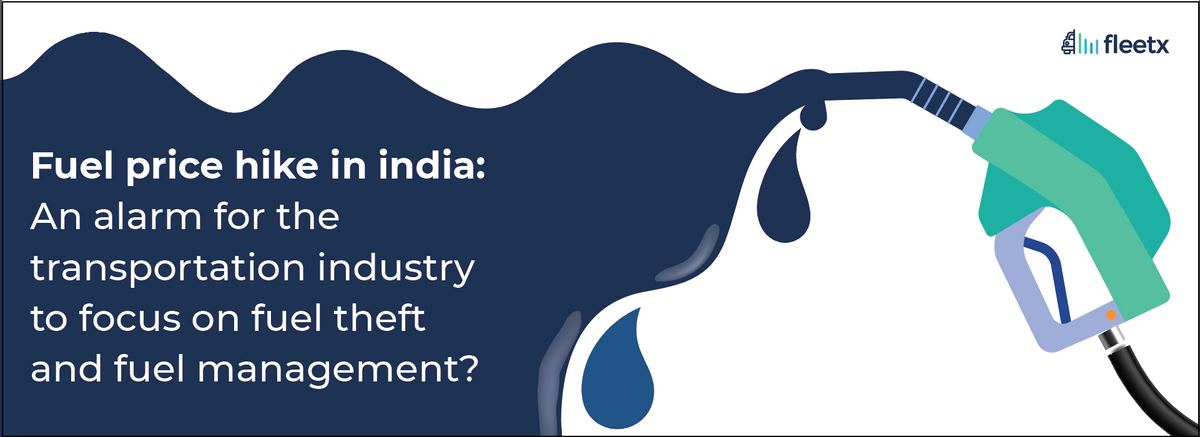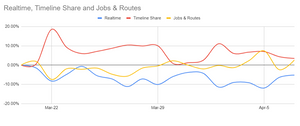Gone are the days when one had to scramble around running post to pillar, asking for directions to their destination. Popularized by spy-thriller movies in the 80s and commercialized for personal use by introducing Google Maps, the GPS tracking system indeed has come a long way. It has wholly redefined personal commute with technologies like navigation, real-time traffic, among others, bringing us the entire world map at our fingertips. But, on the other hand, the introduction of GPS vehicle trackers and tracking systems has revolutionized the commercial sector altogether. In addition to that, advancement in technology and adaptation towards tech-driven software services has expanded the scope of GPS tracking systems beyond navigation and maps.
What is a GPS tracking system?
Before we jump into specifics of vehicle GPS tracking for commercial use like GPS tracking system for fleet management, vehicle GPS tracking, etc., let us understand the GPS tracking system, how does it work, and its brief history.
A vehicle tracking system or popularly called a GPS tracking system uses satellite technology and software to collect and provide location-based data for one or many vehicles to the user. A tracker is installed in these vehicles, which collects location-based data and, using a satellite navigation system, processes and displays their location in real-time on an electronic map accessed through any device. One of the sectors that heavily utilizes the capabilities of GPS tracking systems is transportation. For example, GPS tracking systems are beneficial for modern fleet management as it helps fleet managers track their fleet in real-time. Some examples of fleet management GPS tracking systems are e-taxi services, public transportation, etc.
History of GPS tracking system
Initially developed by US Air Force for military and intelligence use, GPS tracking system technology was made available for commercial use in the 1980s, followed by private use. When it was introduced, the high cost of acquiring a GPS tracking system made it inaccessible. However, a series of policy changes and technology improvements made it cheaper and more accessible, thus, promoting development for transportation and related-commercial sector. In addition, drastic developments in computer technology and the spread of the internet allowed for its various service-related application, particularly in fleet management and navigation.
How does a GPS tracking system work?
Vehicle tracking systems rely on the Global Navigation Satellite System (GNSS) to work. GNSS is a global navigation technology that consists of a constellation of satellites receiving and transmitting data from space. GPS (United States) and GLONASS (Russia) based vehicle tracking systems are the most common GNSS systems that make vehicle tracking possible.
The network of satellites transmits microwave signals received by GPS receivers, part of the vehicle tracking system. Various tracking stations around the globe control these positioning systems by tracking signals from the satellites. GPS receivers convert these satellite signals into usable data that a user can interpret. The vehicles on the ground are fitted with vehicle tracking devices that receive data related to location, speed, time, and direction from the satellites part of the GNSS systems.
GPS tracking systems can provide both historical and real-time location-based data of any vehicle. Additionally, GPS tracking system service providers offer software and systems that use GPS data to provide meaningful insights related to route planning, real-time vehicle tracking, traffic monitoring needed for efficient GPS tracking for fleet management.
Uses of a GPS Tracking System
GPS tracking systems have endless applications in transport and navigation-related services. The internet boom that followed after the 1990s made way for various technological advancements in GPS tracking and navigation. Whether it was transport, logistics, or personal commute, GPS-based monitoring, and navigation system was being adopted everywhere. Let us look at some of the most distinctive uses of GPS tracking systems in the post-tech boom industry.
GPS tracking system for public transportation network
Various governments worldwide adapted the GPS tracking system for vehicles to make their transport network more efficient and transparent. Moreover, it made it possible to provide real-time status of public modes of transport like buses and trains. Thus, it considerably improved the quality of life for their citizens. Now they could plan their commute more efficiently and get updated about canceled, delayed, or the current status of either bus, trains, or planes.
GPS tracking system for commercial transport navigation
Planes and ships, which are very important to the commercial logistics and transportation industry, became more efficient with introducing the GPS tracking system. As a result, it significantly reduced delays and accidents as well as improved transportation efficiency drastically. In addition, GPS tracking system for trucks made on-route navigation and reduced rerouting and poor navigation scenarios reducing operational cost for transporters.
GPS tracking system for personal vehicle navigation
Another popular utility of the technology is the GPS tracking system for cars. Nowadays, cars come with a preinstalled navigation system that helps drivers navigate long routes and their daily commute. In addition, higher-end cars like Tesla come with the best GPS tracking device for cars. They offer a full-fledged vehicle tracking system to prevent theft and locate their car quickly. GPS tracking app for cars is also a popular feature and common occurrence in high-end cars. Additionally, one can get it installed in their vehicle easily. Car GPS tracking device prices have considerably come down due to technological innovation, making it more accessible.
GPS tracking system for e-taxi services
Internet-based on-demand taxi services have become popular all over the world. Companies like Uber, Lyft, Ola, etc., have revolutionized taxi services. Their business model relies on GPS tracking systems to provide real-time location, pickup & drop, real-time movement, among others, to both users and drivers. Such e-taxi services manage a fleet of cars in thousands. They operate their fleet using fleet GPS tracking solutions like fleet management GPS tracking software offered by companies like fleetx that offers one of the best fleet GPS tracking systems in the market.
GPS tracking system for fleet management
Fleet management is a very challenging task whether you are a transporter or goods-producing company. For decades, the process of monitoring and tracking vehicles in a fleet was done manually through phone calls increasing over-dependence on drivers. However, since the introduction of GPS tracking fleet management solutions, managing the fleet has become exponentially more accessible, and the operations became much transparent. Fleet managers can track each of the vehicles in their fleet in real-time by incorporating fleet management GPS tracking software like fleetx.
In addition, various fleet management service providers offer GPS tracking for fleet trucks and GPS tracking devices for trucks. GPS tracking systems for the entire fleet make operations transparent and prevent rerouting, under-construction roads, traffic data, etc. This article focuses on GPS tracking and fleet management system for companies and transporters and how installing a GPS tracking system can improve their operational efficiency and cut operating costs by avoiding unnecessary trips.
Problems faced by fleet managers without a GPS tracking system.
Fleet management, whether for logistics, transportation, or any related business, requires constant supervision and oversight over operations of on-route vehicles. Without a GPS tracking truck management system, fleet managers have to rely entirely on drivers to monitor vehicle’s location, which can often be not the best solution. Let’s look at some of the most common problems faced by fleet managers.
Delay in communicating and sending help in case of malfunction or accident
Due to lack of location data, the vehicle breaks down in a remote area, road accident, theft, or delays, sending support or providing maintenance could be delayed. These scenarios can go unnoticed unless informed by the driver. No communication from drivers can also leave the fleet manager oblivious to such incidents without a GPS tracking system for trucks or other vehicles.
Malpractices, rerouting, and unwanted stoppages go unnoticed at times.
The absence of a .vehicle management system with GPS tracking is responsible for transparency in the operations. Malpractices like vehicle theft, unwanted stops, overspeeding, rerouting, diversions, etc., which cause substantial financial damages and reduce efficiency, can go unnoticed as there is no way to track them. A GPS tracking system makes it possible to immediately monitor and flag such instances for fleet managers to take appropriate action.
It leads to poor route planning due to a lack of historical trip data.
Data from previous trips tracked by a GPS vehicle tracker or GPS tracking unit are used to optimize the route planning process and increase the fleet’s efficiency. However, if no data is being recorded, Fleet Managers cannot have effective and efficient strategies for improving future route planning.
The poor mental health of Fleet Managers
Since lack of GPS or vehicle tracking system requires Fleet Managers to be available 24x7 over the phone for their vehicles on the trip. They are constantly under pressure until the goods are correctly delivered. This impacts their work-life balance poorly, leading to adverse effects mentally.
Benefits of GPS tracking system for fleet management
So far, we have looked at GPS tracking systems and their most common use-cases. Now, we will focus on GPS tracking systems for fleet management and some of its most essential benefits for companies and transporters.
GPS tracking systems increase fleet visibility and transparency.
Fleet GPS tracking systems exponentially increase visibility and transparency in the operations. They make it possible for fleet managers to monitor their entire fleet’s daily operations, thus, significantly increasing productivity, reducing operational cost, and staying up-to-date with vehicle maintenance and fleet performance. Intelligent GPS tracking system for trucks flags unusual activity and alerts fleet managers if there are too many unwanted stops, unnotified route change, unwanted stops, etc. As a result, fleet managers can take prompt action, especially in the case of time-bound deliveries. Using GPS tracking systems, companies can significantly improve their fleet performance and offer more efficient services to their customers with timely and safe deliveries.
Vehicle tracking systems can assist in efficient fleet maintenance.
Vehicle breakdowns on-route is a common occurrence for transporters. Such breakdowns are commonly resolved by sending maintenance support or help to the vehicle’s location. Frequent vehicle breakdown that causes delays in deliveries and hampers efficiency can be prevented by timely maintenance and inspection of vehicles. However, it is not possible to manually keep track of the care and health of all vehicles in the fleet. Intelligent vehicle tracking systems for fleet management like fleetx offer services like Engine & tyre utilization reports and real-time DTC alerts that enable fleet managers to prevent breakdowns beforehand. Automated service reminders help automate routine inspections, ensuring timely maintenance, thus, reducing high maintenance costs in breakdowns.
GPS tracking systems offer advanced analytics to assess fleet performance over time.
GPS tracking systems use GPS trackers to track and store historical location & vehicle-based data for all vehicles in the fleet. Advanced fleet management systems offering GPS tracking systems use artificial intelligence and data utilize the collected data and process it into meaningful insights. These insights and assessments can be used by fleet managers to find & fix inefficiencies in their operations and assess overall fleet and driver performance. Advanced GPS Vehicle Tracking System using trend lines, interactive dashboards, advanced reports, and planned vs. actual SLA comparisons.
Smart GPS tracking for the fleet offers real-time reports and driver behavior analytics.
Some of the most advanced and tech-driven fleet management services providers offer tracking systems that provide detailed and analytics vehicle reports in real-time. This includes fuel consumption, utilization, route planning, driver performance, and other key metrics to optimize current and future trips with higher efficiency. In addition to tracking, they also offer some interesting AI-based behavior analytics that lets fleet managers assess driver performance based on critical metrics like fatigue, rash-driving, over-speeding, etc. These metrics help reward efficient drivers and reskill poor-performing ones. It reduces the chances of accidents as well as mitigates losses occurred during operations.
Choosing the right GPS tracking system for your business
Many fleet management service providers offer one kind of GPS tracking system for all customers, kind of like a one-size-fits-all approach. However, different companies based on their industry and use require optimized tracking services based on their requirement. Hence, it becomes crucial to choose the right type of tracking device for your fleet. Fleetx offers one of the most consumer-friendly fleet management services that can be tailored based on the requirements of the business. Whether it is in-plant logistics requiring RFID-based tracking systems, more affordable SIM-based tracking systems, or industry-focused tracking systems, they offer a plethora of services that can be customized based on the needs of the customer.
Some important points to consider when choosing the right GPS tracking system for your company,
- Sector or industry in which the company operates
- Use-cases for tracking
- The scale of transportation operation
- Number of active & stand-by vehicles
- Geographical area of location
- Number of owned and third-party vehicles
Conclusion
GPS tracking system for fleet management is improving exponentially with the advent of new technologies and data utilization. In addition, AI-driven fleet management services providers like fleetx offer various other features and services that help companies improve their operating efficiency and exercise more control and supervision over transport operations. Features like Alerts & Notifications for high fuel consumption, overspeeding, load & unloading keep fleet managers alert for unusual activities and take prompt action. While predictive maintenance and remote diagnostics help them provide customer and maintenance support to their on-route drivers promptly.
Further Readings
The Challenges faced by an Indian Truck Driver (fleetx.io) and Cargo Theft - India's Not-So-New Problem (fleetx.io) talks about the most common problems and challenges faced by Indian truck drivers across geography and sectors. Automation in Fleet Management: Is it worth it? (fleetx.io) talks about how automation in fleet management coupled with transparency offered by GPS tracking systems can improve operating efficiency and cut costs for businesses.
How does a GPS tracker work?
GPS trackers connect to a constellation of satellites, to pinpoint their location. The tracker employs a technique known as trilateration to calculate latitude, longitude, elevation, and time by comparing its location to that of three or more satellites in the Global Navigation Satellite System (GNSS) network and calculating its separation from them.
How does GPS work in vehicles?
GPS vehicle navigation systems work by creating travel routes to a certain location depending on a variety of factors by combining the usage of satellite signals with dynamic on-board maps. Some GPS auto navigation systems can automatically take construction and traffic into account when choosing the optimum route because they are connected to sources of traffic information. GPS vehicle navigation systems can instantly repair a mistake with an updated route if the driver misses a turn.




